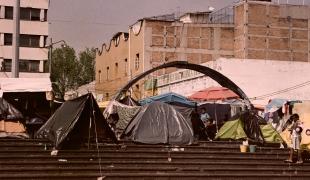South Sudan Conflict : Violence Against Healthcare
Communiqué de presse
Large parts of South Sudan have been engulfed in conflict for the past six months. On 15 December 2013, violence broke out amongst security forces in the capital Juba, following longstanding political tensions within the ruling party.
As security forces split largely along ethnic lines, fighting between forces loyal to President Salva Kiir and forces loyal to former Vice President Riek Machar quickly spread into Jonglei, Unity and Upper Nile states.
To date approximately 1.5 million people have fled their homes, with over one million displaced inside South Sudan, and 378,000 seeking refuge in Ethiopia, Kenya, Sudan and Uganda. Inside South Sudan, internally displaced people (IDPs) are living in camps or the open air. Those in IDP camps include an estimated 94,000 people living in Protection of Civilian (POC) sites inside the United Nations Mission in South Sudan (UNMISS) bases across the country.
In many areas camps are dangerously overcrowded and suffer inadequate water and sanitation. Such conditions heighten tensions and bring increased risks of epidemics. Those living in the open, without adequate food, clean water or shelter are also extremely vulnerable to malnutrition and outbreaks of diseases such as malaria. The conflict has seen disturbing trends of violence and brutality. This has included large scale killings of civilians, and targeting of people based on their ethnicities and perceived political allegiances – including in Juba, Bor, Malakal and Bentiu. In other areas, entire towns, such as Leer in Unity state, have been destroyed.
One particularly stark aspect of the conflict has been violence against healthcare. Patients have been shot in their beds, medical and humanitarian staff have been killed, and hospitals, ambulances and medical equipment have been burnt, looted and otherwise destroyed.
Hospitals and places meant to shelter civilians from hostilities are specifically protected under International Humanitarian Law (IHL). These rules have been violated repeatedly throughout the current conflict in South Sudan. An already fragile healthcare system has been destroyed in areas affected by conflict and largely neglected in other areas, leaving hundreds of thousands of people without medical care at a time when it is critically needed.
MSF has repeatedly condemned such violence against healthcare facilities, patients and staff. Such incidents have greatly affected its ability to deliver humanitarian assistance to vulnerable people.
With this briefing paper, MSF seeks to bring into focus the impact of persistent violence on medical activities since 15 December 2013. The information presented is far from exhaustive, and only highlights those incidents of which MSF has direct or verifiable knowledge. It is important to note that many incidents that deny the wounded and sick access to healthcare go unreported; this is particularly the case in rural areas.
Moreover, while this briefing paper focuses on violence against healthcare in the past six months, attacks against medical care are not new in South Sudan. Throughout its 30-year history in the country, MSF – as well as other humanitarian organisations and healthcare providers – has repeatedly witnessed violence against staff, patients, vehicles, compounds and healthcare facilities. What has been particularly alarming in the current conflict, however, has been the scale and breadth of the violence.
A brief history of violence against healthcare in South Sudan
Violence against healthcare, including against the medical mission of humanitarian organisations, is not new in South Sudan. MSF itself has experienced numerous serious security incidents in its projects, particularly in Jonglei and Unity states. This has included abductions of medical staff, killings of patients and medical staff, and attacks against MSF facilities and vehicles, including entire hospitals being burnt to the ground. In Unity state, between 1993 and 2000, eight of MSF’s local health workers were killed, two trying to escape from an MSF hospital.
In the past decade, violence against healthcare provision was of particular concern in Jonglei state, where longstanding ethnic rivalries led to instances of healthcare being specifically targeted with the intention of depriving the perceived enemy of medical care.
Among the numerous incidents, one particularly violent attack was the killing of four patients in the MSF compound next to Bor State Hospital in 2007. As a result, MSF completely closed activities in Bor for several years. As of June 2014, MSF is planning on restarting operations to support the hospital.
More recently, MSF health centres were destroyed or looted in Pieri (August 2011), in Pibor and Lekwongole (December 2011), in Lekwongole again (August 2012), and in Gumuruk (September 2012). This adds up to six clearly marked MSF facilities being looted or destroyed in South Sudan over a span of 18 months.
In 2013, incidents against medical and humanitarian workers included an attack on a clearly marked MSF car, on the main road outside of Juba. Two MSF staff were seriously injured of whom, one died two days later.
MSF calls on all armed actors to cease violence against healthcare and to ensure respect for medical facilities, staff and patients. MSF appeals for greater accountability from all actors participating in hostilities throughout the entire chain of command.


